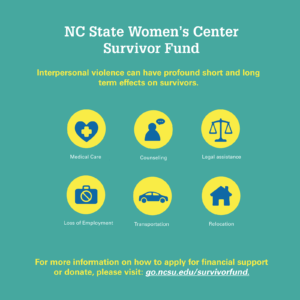
Five weeks into social distancing, we have all felt a multitude of emotions as we make our way through the experience of the collective trauma of COVID-19.
In the course of that time, it’s been nearly impossible to escape the online pressure to demonstrate productivity and worth, as measured by work completed, hours studied or even new hobbies or projects undertaken. Instead of fixating on society’s pressure to produce, we should really be focused on the fact that we are operating in basic survival mode.
Most of us are experiencing heightened levels of anxiety and depression, whether it’s the disruption to our work/schooling, forced relocation, the loss of our jobs and livelihoods, the added responsibilities of educating our children or caring for extended family, the grief of losing loved ones or the fear of getting sick ourselves.
While many of us have had to negotiate some, if not all, of these concerns, survivors of interpersonal violence are experiencing unique impacts of COVID-19. For example, survivors of domestic/dating violence, sexual assault, stalking, and sexual harassment may face:
- reduced access to in-person services and resources, including counseling, support groups, and emergency shelter;
- isolation from supportive individuals and networks;
- increased risk of violence when sheltering in place with an abuser;
- increased risk of experiencing new forms of abuse such as cyberstalking, online harassment, financial abuse and control over movement and resources;
- increased triggers related to PTSD, anxiety and social distancing;
- increased stress due to relocating to homes with unsupportive family members;
- reduced access to safe and private spaces for seeking remote support (calling a helpline, police or a friend; participating in online counseling, etc.), particularly when sheltering in place with abusers and/or family who may not be aware of their situation;
- financial uncertainty due to loss of employment and income.
All of these impacts are compounded for student survivors who are experiencing multiple layers of insecurity due to the trauma they experienced as a result of IPV as well as the effects of COVID-19.
The Women’s Center has seen an increase in students seeking support from our trained advocates as well as a significant increase in applications to our Survivor Fund, which can be used to cover expenses related to experiencing IPV, such as medical care, counseling or therapy, legal assistance, loss of employment, transportation, relocation and/or safety upgrades to housing. This recent COVID-related increase comes on top of a 12-fold increase in Survivor Fund applications over the past two academic years.
How You Can Help
While the Women’s Center continues to support an increased number of survivors during the pandemic, we are also in need of your support so that we can provide the critical emergency funding survivors need. You can join us in this effort by:
 donating to the Survivor Fund at go.ncsu.edu/donatesurvivorfund;
donating to the Survivor Fund at go.ncsu.edu/donatesurvivorfund;- emailing the donation link to others and encouraging them to donate as well;
- pledging to be a monthly sustainer;
- enrolling in payroll deduction (search for the Survivor Fund, Acct: 147330/667798);
- sharing our social media campaign with your followers on Instagram and Facebook;
- requesting time to speak at one of your upcoming work or student organization meetings to talk about the critical work of the Survivor Fund;
- publicizing information about donating to the Survivor Fund in your departmental or student organization newsletter;
- linking to this article on your website and social media platforms;
- learning more about our work and how you can support survivors in other ways, including reading the companion article about the resilience of survivors with tips for students, faculty and staff to navigate crisis.
During COVID-19, survivors of interpersonal violence need our support now more than ever. Join us in ensuring that every survivor knows that the Wolfpack community sees them, believes them and is here for them.
** If you or someone you know is experiencing relationship violence, sexual violence or stalking and are in need of advocacy services, the Women’s Center has trained advocates available to offer crisis intervention, emotional support, resources and referrals. Please contact us at the 24/7 Sexual Assault Helpline at 919.515.4444 or ncsuadvocate@ncsu.edu to be connected with an advocate. For more information, please see go.ncsu.edu/supportsurvivors. **
Janine Kossen (she/her) is associate director for interpersonal violence services in the Women’s Center.